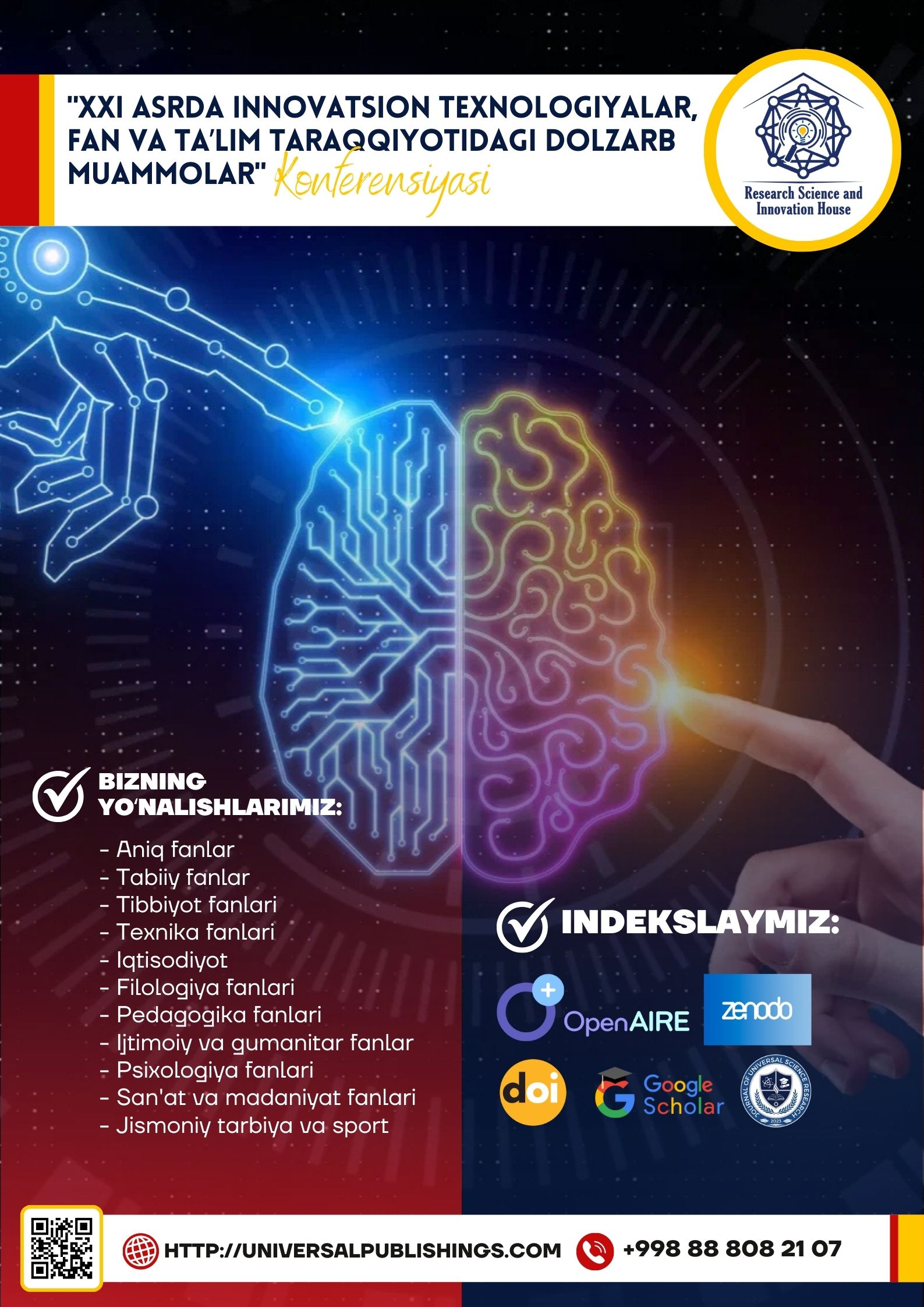Abstract
This article explores the use of songs and music as a tool for teaching
listening skills, highlighting its benefits for learners of all ages and contexts. It explains why
music is effective, emphasizing its ability to capture attention, enhance memory, and promote
active listening. The article also provides practical strategies, such as lyric-focused activities, singing along, and genre exploration, to engage learners and improve their listening abilities. It concludes by discussing the broader advantages of using music, including fostering cultural
understanding and emotional connection. This resource is valuable for educators, language
instructors, and anyone interested in innovative teaching methods.
References
1. Brown, H. D. (2007). Principles of Language Learning and Teaching (5th ed.). Pearson Education. 2. Gardner, H. (1983). Frames of Mind: The Theory of Multiple Intelligences. Basic
Books. 3. Harmer, J. (2007). The Practice of English Language Teaching (4th ed.). Pearson
Longman. 4. Murphey, T. (1992). Music and Song: Resource Books for Teachers. Oxford University
Press. 5. Richards, J. C., & Rodgers, T. S. (2014). Approaches and Methods in Language
Teaching (3rd ed.). Cambridge University Press. 6. Wallace, C. (1992). Reading. Oxford University Press. 7. Zatorre, R. J., & Salimpoor, V. N. (2013). "From Perception to Pleasure: Music and Its
Neural Substrates." Proceedings of the National Academy of Sciences, 110(2), 10430-10437. 8. Teshaboyeva, N., & Mamayoqubova, S. (2020). COMMUNICATIVE APPROACH
TO LANGUAGE TEACHING. In МОЛОДОЙ ИССЛЕДОВАТЕЛЬ: ВЫЗОВЫ И
ПЕРСПЕКТИВЫ (pp. 409-414). 9. Teshaboyeva, N. (2020). LINGUISTIC PERSONALITY, ITS STRUCTURAL
CHARACTERISTICS IN THE NEW PERSPECTIVE DIRECTIONS. In МОЛОДОЙ
ИССЛЕДОВАТЕЛЬ: ВЫЗОВЫ И ПЕРСПЕКТИВЫ (pp. 415-420). 10. Teshaboyeva, N. Z. (2019). TEACHING ENGLISH THROUGH LITERATURE
INTESL AND TEFL CLASSROOMS. In СОВРЕМЕННЫЕ ТЕХНОЛОГИИ:
АКТУАЛЬНЫЕ ВОПРОСЫ, ДОСТИЖЕНИЯ И ИННОВАЦИИ (pp. 82-84). 11. Хидирова, Д., & Тешабоева, Н. (2022). Pedagogical conditions for the
development of the healthy thinking in students. Zamonaviy innovatsion tadqiqotlarning
dolzarb muammolari va rivojlanish tendensiyalari: yechimlar va istiqbollar, 1(1), 120-122. 12. Gaybullayeva, N. D. K., & Kizi, T. N. Z. (2022). THE ROLE OF
INNOVATIVE METHODS FOR LISTENING COMPREHENSION IN TEACHING
LANGUAGE LEARNERS FOREIGN LANGUAGES AND MAINLY ENGLISH. Central
Asian Research Journal for Interdisciplinary Studies (CARJIS), 2(10), 8-10.
2-TOM, 11-SON
984
13. Teshaboyeva Nafisa Zubaydulla qizi, Jurayev Muhammadrahim Murod o’g’li, &
Mamirova Munisa Rajab qizi. (2021). Language Learning Culturally and the Role of
Literature in Teaching Process. Central Asian Journal of Theoretical and Applied
Science, 2(3), 1-5. Retrieved from
https://www.cajotas.centralasianstudies.org/index.php/CAJOTAS/article/view/84
14. Teshaboyeva, N. (2023). THE IMPORTANCE OF TOURISM IN PRESENT
DAY. Журнал иностранных языков и лингвистики, 5(5). 15. Teshaboyeva, N. (2023). THE MODERN INNOVATIVE TECHNOLOGIES IN
TEACHING FOREIGN LANGUAGES. Журнал иностранных языков и лингвистики, 5(5). 16. Teshaboyeva, N. Z. (2023, November). Adjective word group and its types. In " Conference on Universal Science Research 2023" (Vol. 1, No. 11, pp. 59-61). 17. Teshaboyeva, N. Z. (2023, November). Modifications of Consonants in
Connected speech. In " Conference on Universal Science Research 2023" (Vol. 1, No. 11, pp. 7-9).18. Teshaboyeva, N., & Rayimberdiyev, S. (2023, May). THE IMPORTANCE OF
USING MULTIMEDIA TECHNOLOGY IN TEACHING ENGLISH CLASSES. In
Academic International Conference on Multi-Disciplinary Studies and Education (Vol. 1, No. 8, pp. 149-153). 19. Nafisa, T., & Marina, S. (2023). TEACHING AND LEARNING OF ENGLISH
VOCABULARY IN TESL AND TEFL CLASSROOMS. International Journal of
Contemporary Scientific and Technical Research, 465-469. 20. Teshaboyeva Nafisa Zubaydulla kizi, & Akramov Ibrohimjon. (2023). WORD
FORMATION. COMPOUNDING. "XXI ASRDA INNOVATSION TEXNOLOGIYALAR, FAN VA TAʼLIM TARAQQIYOTIDAGI DOLZARB MUAMMOLAR" Nomli Respublika
Ilmiy-Amaliy Konferensiyasi, 1(12), 109–113. Retrieved from
https://universalpublishings.com/index.php/itfttdm/article/view/3187
21. Teshaboyeva, N., & Yakubova, N. (2023). CHANGES OF MEANING OF
WORDS. Центральноазиатский журнал образования и инноваций, 2(12), 126-129. 22. Sharifova Dinora Tohir qizi, & Teshaboyeva Nafisa. (2023). “ NOUNS AND
THEIR GRAMMATICAL CATEGORIES”. Новости образования: исследование в XXI
веке, 2(16), 292–297. извлечено от
http://nauchniyimpuls.ru/index.php/noiv/article/view/13128
23. Teshaboyeva Nafisa Zubaydulla kizi, & Akramov Ibrohimjon. (2023). WORD
FORMATION. COMPOUNDING. "XXI ASRDA INNOVATSION TEXNOLOGIYALAR, FAN VA TAʼLIM TARAQQIYOTIDAGI DOLZARB MUAMMOLAR" Nomli Respublika
Ilmiy-Amaliy Konferensiyasi, 1(12), 109–113. Retrieved from
https://universalpublishings.com/index.php/itfttdm/article/view/3187
24. Qodirova Aziza Yunusovna, & Teshaboyeva Nafisa Zubaydulla qizi. (2023). “VERBS AND THEIR GRAMMATICAL CATEGORIES”. Новости образования:
2-TOM, 11-SON
985
исследование в XXI веке, 2(16), 280–283. извлечено от
http://nauchniyimpuls.ru/index.php/noiv/article/view/13126
25. Tuxtayeva Aziza Ilhom qizi, & Teshaboyeva Nafisa. (2023). Word Formation:
Compounding . "Conference on Universal Science Research 2023", 1(12), 113–115. Retrieved from https://universalpublishings.com/index.php/cusr/article/view/3185
26. Teshaboyeva Nafisa Zubaydulla, & Iskandarova Sarvinoz Shukurullo qizi. (2023). THE CLASSIFICATION OF SYNONYMS AND THEIR SPECIFIC
FEATURES. "XXI ASRDA INNOVATSION TEXNOLOGIYALAR, FAN VA TAʼLIM
TARAQQIYOTIDAGI DOLZARB MUAMMOLAR" Nomli Respublika Ilmiy-Amaliy
Konferensiyasi, 1(12), 126–131. Retrieved from
https://universalpublishings.com/index.php/itfttdm/article/view/3191
27. Тешабоева, Н. (2023). Teaching writing as a major part of productive skills in
mixed ability classes . Информатика и инженерные технологии, 1(2), 652–656. извлечено
от https://inlibrary.uz/index.php/computer-engineering/article/view/25759
28. Teshaboyeva, N., & Yakubova, N. (2023). WORD FORMATION. COMPOUNDING. Development of pedagogical technologies in modern sciences, 2(12), 187-192. 29. Teshaboyeva, N. (2023). Compound sentences in the English language. Yangi
O'zbekiston taraqqiyotida tadqiqotlarni o'rni va rivojlanish omillari, 2(2), 68-70. 30. Nafisa, T. (2023). THE USA ECONOMY, INDUSTRY, MANUFACTURING
AND NATURAL RESOURCES OF GREAT BRITAIN. INTERNATIONAL JOURNAL OF
RECENTLY SCIENTIFIC RESEARCHER'S THEORY, 1(9), 94-97. 31. Nafisa, T. (2023, December). Secondary ways of word formation. In " Conference on Universal Science Research 2023" (Vol. 1, No. 12, pp. 109-112). 32. Nafisa, T. (2023). VOWELS AND THEIR MODIFACATIONS. Новости
образования: исследование в XXI веке, 2(16), 298-305. 33. Nafisa, T. (2023, December). Secondary ways of word formation. In " Conference on Universal Science Research 2023" (Vol. 1, No. 12, pp. 109-112). 34. Nafisa, T. (2023). THE EDUCATION SYSTEM OF THE USA: PRESCHOOL
EDUCATION, SECONDARY AND HIGHER EDUCATION, SCHOOL FORMS. The Role
of Exact Sciences in the Era of Modern Development, 1(6), 53-57. 35. Qizi, T. N. Z., & Umedovich, M. Y. (2023). AMERICAN-BASED
PRONUNCIATION STANDARDS OF ENGLISH. Scientific Impulse, 2(15), 563-567. 36. Nafisa, T. (2023, December). Word Formation: Compounding. In " Conference
on Universal Science Research 2023" (Vol. 1, No. 12, pp. 113-115). 37. Nafisa, T. (2023). NOUNS AND THEIR GRAMMATICAL
CATEGORIES. Новости образования: исследование в XXI веке, 2(16), 292-297

